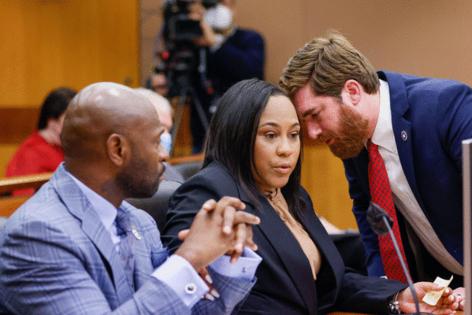Analysis: What could appeal of Fani Willis fight mean for Fulton Trump case?
Published in Political News
ATLANTA — Wednesday’s announcement from the Georgia Court of Appeals that it will review a judge’s ruling that allowed Fulton County District Attorney Fani Willis to continue prosecuting former President Donald Trump will have major implications on the election interference case.
Here’s what the consideration from the state’s second-highest court could mean:
Significant delays coming
Even before this week it was looking unlikely that Fulton prosecutors were going to get their wish of an August trial start date. Now, with the question of Willis’ removal tied up in appeals court, legal observers are predicting that any major action on the underlying Trump election case will be postponed until well into 2025. That means voters heading to the polls this fall almost certainly will not know if the expected GOP nominee for president will be found guilty or not by a jury for his efforts to overturn the results of the 2020 election.
As to why analysts are so confident nothing will happen before the new year? The busy Court of Appeals isn’t known for moving particularly fast. Once three judges are assigned to the case they must schedule oral arguments and make a decision within two terms of court. If judges are assigned before July, that means a decision would need to be made by mid-March 2025. After that, whichever side loses is expected to appeal to the Supreme Court of Georgia. That’s before jury selection for the underlying case could begin.
Possible nightmare scenarios for Willis
For the first three months of the year, the DA faced a barrage of negative headlines and court filings that delved into the most intimate details of her personal life. It all culminated in a dramatic evidentiary hearing in February in which Willis and Nathan Wade, her ex-boyfriend who at the time was the lead prosecutor on the election case, both took the witness stand to defend their actions — all under the glare of the national media.
Even with Wade off the case, many of those matters will be re-litigated before the appeals court. The panel won’t be collecting new evidence, but it will determine whether Fulton Superior Court Judge Scott McAfee arrived at the correct legal conclusions when he gave Willis a path to stay on the case. It’s possible the court overturns McAfee’s ruling and issues what would be a nightmare decision for Willis and her office: mandating that she be removed from the biggest case of her career and that her staff, with expertise generated over more than three years of work, also be disqualified. Trump and his co-defendants also want the charges against them dropped, which if granted would be a catastrophic result for prosecutors.
The court’s pace also means that the fight will continue to loom over Willis as she runs for reelection. She faces a primary challenger in Christian Wise Smith on May 21, and the winner of the Democratic contest will move on to face Republican Courtney Kramer in November. Willis is seen as the overwhelming favorite in both contests, but the revival of the disqualification fight certainly isn’t what the DA wants to be talking about on the campaign trail. Her GOP critics will make hay of the appeals’ court’s consideration and continue to slam her for it in public.
A revival of other pretrial fights?
The Court of Appeals’ decision to take up the disqualification issue also could open the door to revisit other pretrial issues Judge McAfee previously has decided, said Atlanta defense attorney and appellate lawyer Andrew Fleischman. In other words, now that the appeals court has agreed to hear the disqualification issue, defendants may be able to challenge other rulings they’ve lost in the election case since August, when McAfee was assigned. Among the items that could be considered: McAfee’s recent refusal to drop some of the charges against Trump and others on First Amendment grounds.
McAfee can keep working – for now
McAfee previously said he intends to keep moving forward on some of the case’s other outstanding procedural issues as the appeals court proceeds. Among them are pretrial motions challenging the soundness of multiple counts in the indictment, including the racketeering and false statements charges. Defendants have also challenged the indictment based on the U.S. Constitution’s Supremacy Clause, double jeopardy and the idea that former federal officers should be immune from state-level prosecutions. They have asked for him to change the venue of the trial out of Fulton County and to split up the 15 remaining defendants. The judge recently asked the two sides to brief him about several counts in the indictment that have to do with materials presented to Georgia’s federal court in late 2020. Some legal experts have argued that those alleged criminal acts could fall under federal, not state jurisdictions.
However, it’s possible that Trump or his co-defendants could seek a stay from the appeals court, which would bar McAfee from moving forward until the appeal is resolved. That would further delay matters.
-------
(Staff writer Bill Rankin contributed to this article.)
©2024 The Atlanta Journal-Constitution. Visit at ajc.com. Distributed by Tribune Content Agency, LLC.







Comments